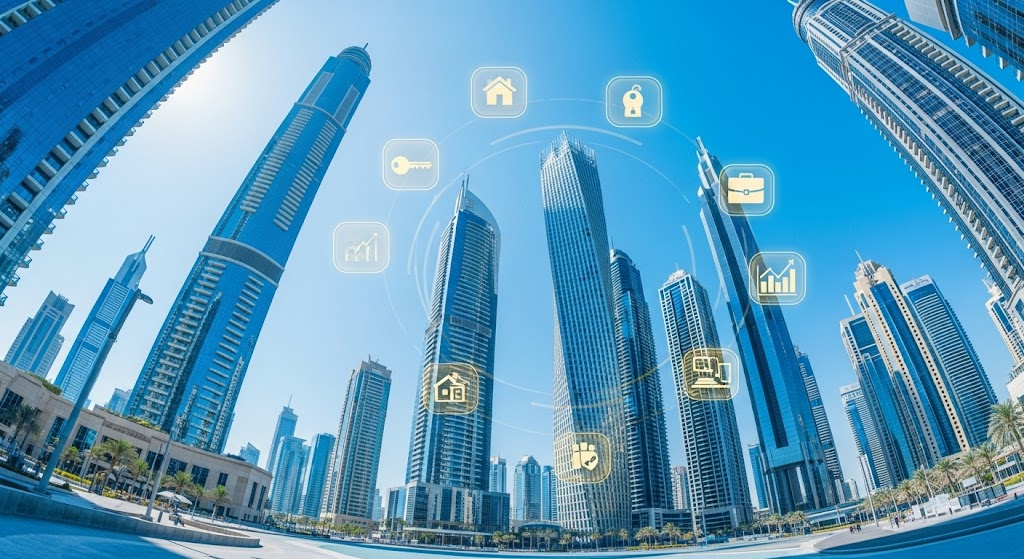Dubai’s real estate market remains one of the world’s most active investment destinations, with policies that welcome global capital and a continuously expanding skyline. The 2025 statistics reveal growth, opportunity, and strength that smart investors recognize as significant market indicators.
Market Performance of Real Estate Business
Transaction volumes increased by 36% in 2024, with 216,000 deals valued at AED 761 billion. Dubai’s GDP expanded by 3.2% to reach AED 231 billion, while the population increased 5% to over 3.8 million residents, creating housing demand that exceeds supply in key areas.
Tourist arrivals increased 9% to 18.7 million visitors, with short-term rental demand growing across all areas and revenue per available room improving 12% year-over-year.
These indicators create sustained demand, benefiting residential and commercial property investors.
Why Global Investors Choose Dubai
Foreign Ownership Rights: Complete foreign ownership is permitted across all sectors, removing historical barriers. Golden Visa programs offer qualifying investors long-term residency options with streamlined requirements. The Dubai Real Estate Strategy 2033 targets 33% homeownership rates, ensuring continued government support.
Investment Returns: 2024 performance metrics show impressive wealth-building potential. Residential prices increased 20% year-over-year, while overall rental rates increased 19% across market segments. 2025 forecasts predict 5-8% annual price growth with rental yields averaging 7%, among the highest globally for major international cities.
Starting a Real Estate Business
Setting up a real estate business in Dubai follows defined processes overseen by the Dubai Land Department (DLD) and Real Estate Regulatory Agency (RERA), typically taking 4-6 weeks.
Foundation Requirements:
Minimum age of 21 years, clean criminal background, and proof of financial capacity. Choose between a mainland or free zone setup with structures including Sole Establishment, Civil Company, or Limited Liability Company (LLC).
Licensing Process:
- DED Trade License: AED 12,000-20,000 depending on business type
- DLD Brokerage License: AED 12,900 for property transaction facilitation
- RERA registration: AED 6,200-10,800 for mandatory training and competency assessments
Total Investment Requirements:
AED 113,100 to AED 188,700, including licenses, office rent, employee processing, and marketing systems.
Investment Opportunities and Prime Investment Locations
Fractional Ownership: Technology platforms have democratized real estate investment. Prypco Mint offers minimum investments starting at AED 2,000 using blockchain technology. Established platforms include SmartCrowd and Stake. Returns vary by property type:
- Residential units: 5-7.5% net returns
- Short-term rental properties: Up to 9% annual returns
- Commercial properties: 6-8% yields
The tokenized real estate market reached AED 3.67 billion in 2025, with projections hitting AED 36.7 billion by 2030.
Off-Plan Investments: Accounted for 60% of sales in 2023, offering early-bird pricing with potential discounts of 10-20% below completed property values and flexible payment plans.
Luxury Markets: Premium locations attract high-net-worth individuals with average luxury property ROI ranging from 8-12% annually, combining rental income and capital appreciation.
Prime Investment Locations for a Perfect Start
- Downtown Dubai: Commercial and cultural center anchored by Burj Khalifa and Dubai Mall. Average rental yields of 6-8% with investment ranges from AED 800,000 for studios to AED 5,000,000 for luxury penthouses.
- Palm Jumeirah: Exclusive artificial island offering waterfront living with villa rental yields of 5-7% and apartment yields of 6-8%. Limited supply ensures consistent value appreciation.
- Dubai Marina: Contemporary waterfront living appealing to young professionals and expatriate families. Rental yields of 7-9% reflect strong demand from diverse tenant segments.
- Emerging Areas: Jumeirah Village Circle (JVC) offers exceptional value with average yields of 8-10%. Dubailand represents significant appreciation potential, with 15-20% growth possible over the next 3-5 years.
Exploring Market Trends of Real Estate Business
- Supply Considerations: 182,000 new units expected during 2025-2026 may create temporary price stabilization with potential 15% price adjustments in oversupplied segments. However, economic diversification and investor confidence will likely prevent significant corrections.
- Sustainability Integration: LEED-certified properties typically command a 5-10% price premium over conventional buildings, with government incentives supporting sustainable development initiatives.
- Technology Impact: Virtual property tours increased remote buyer engagement by 40%. Blockchain transactions provide transparency and reduced processing times, while AI-powered market analysis offers more accurate property valuations.
Future Outlook
Dubai’s real estate trajectory looks promising through 2025, supported by the Dubai 2040 Urban Master Plan and Real Estate Strategy 2033.
Economic diversification reduces oil dependency while strengthening technology, finance, and tourism sectors. Population projections anticipate reaching 5.8 million by 2030, thereby ensuring continued housing demand.
Tourism expansion targeting 25 million annual visitors by 2030 supports residential and hospitality growth. While increased supply may moderate price growth, fundamental demand drivers remain strong, supporting continued appreciation.
Dubai’s real estate market sets global standards for urban development and investment excellence. The convergence of economic diversification, technological innovation, and progressive policies creates conditions for substantial wealth building. Success requires understanding market dynamics, regulatory requirements, and timing considerations.


